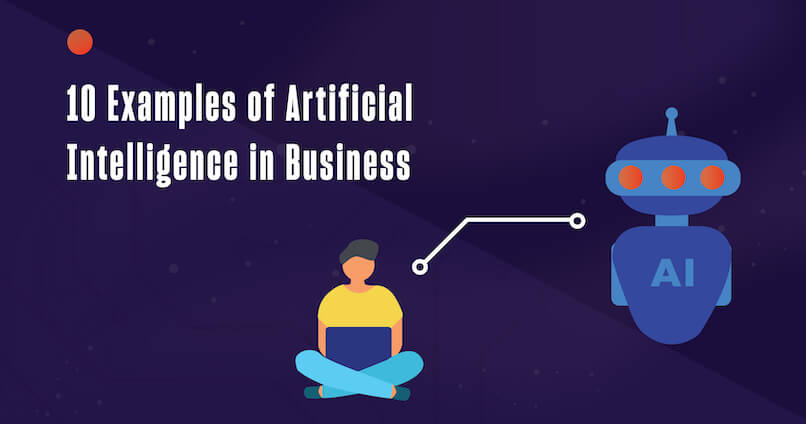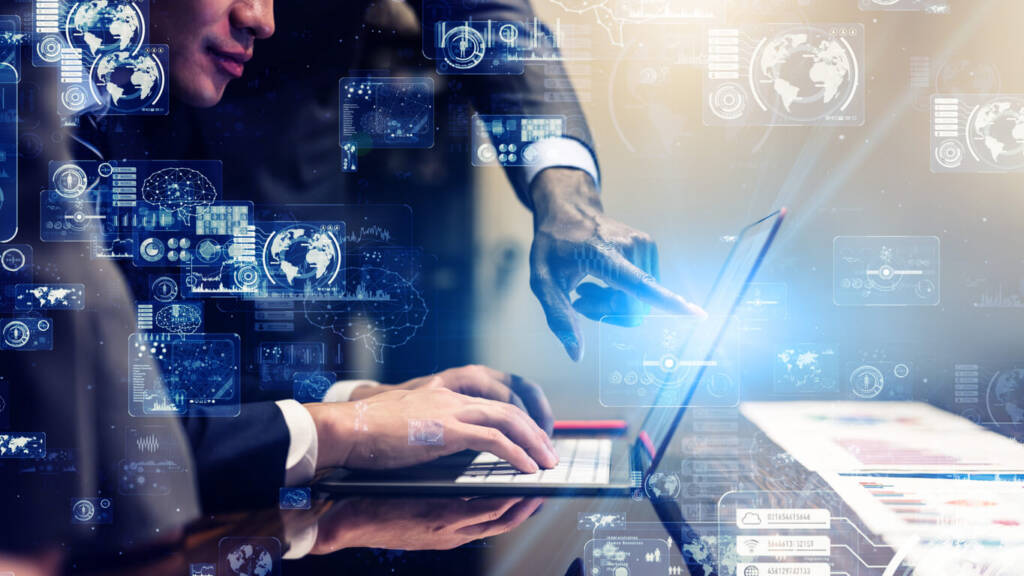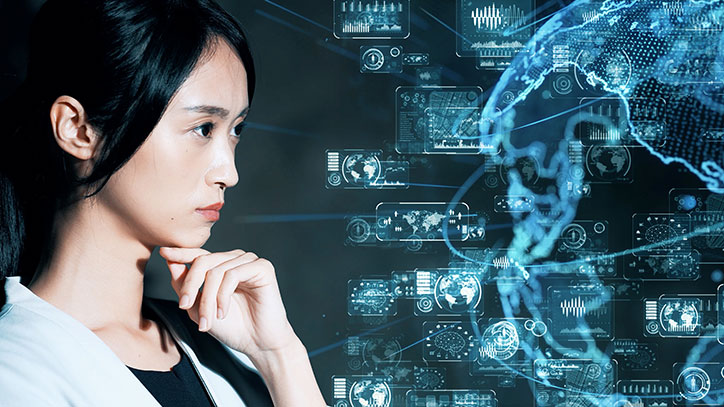Artificial intelligence (AI) has become a cornerstone for businesses across every industry, revolutionizing how organizations approach strategy, operations and customer engagement. From predicting market trends to automating workflows, AI empowers companies to make data-driven decisions, enhance efficiency and drive innovation at unprecedented levels.
The adoption of AI in business began gaining traction in the early 2010s, as organizations sought advanced tools to stay competitive in a rapidly evolving, tech-driven world. Today, its influence spans a wide range of sectors, including marketing, supply chain management, financial services and healthcare. AI enables businesses to streamline operations, improve decision-making and anticipate customer needs with precision. The global AI market is projected to grow from $621.19 billion in 2024 to $2.74 trillion by 2032, with North America leading the way with 41% of the market share.
The benefits of AI for businesses are undeniable — higher productivity, enhanced customer satisfaction and significant cost savings are just the beginning. In this article, we’ll explore ten real-life examples of how businesses are leveraging AI to achieve their goals, adapt to changing markets and create value across various industries.
10 Examples of AI Being Used to Support Business Needs
If you’ve ever asked Alexa for a weather update, chatted with a customer service bot or noticed personalized ads that perfectly align with your interests, you’ve experienced the power of artificial intelligence. While these consumer-facing technologies are familiar, AI’s role extends far beyond our homes and personal devices — it’s also reshaping the way businesses operate, innovate and compete.
As Paul Daugherty, Chief Technology and Innovation Officer at Accenture, notes in a Salesforce article, “The playing field is poised to become a lot more competitive, and businesses that don’t deploy AI and data to help them innovate in everything they do will be at a disadvantage.”
So, how do businesses use artificial intelligence? Here are ten real-world examples of how they are leveraging AI to support their objectives and gain a competitive edge.
- AI for Customer Relationship Management (CRM)
AI is transforming customer relationship management by helping businesses foster stronger customer connections. AI-driven customer relationship management (CRM) tools provide actionable insights, predict customer preferences and streamline communication, enabling companies to deliver personalized and proactive support.
- Personalized marketing campaigns: AI-powered platforms like Salesforce Einstein analyze customer data to deliver highly personalized marketing content that boosts engagement and conversion rates.
- Predictive customer support: Zendesk’s AI tools analyze support tickets to route queries efficiently and predict customer needs, reducing resolution time.
- Chatbots and virtual assistants: Platforms like boost.ai use AI to provide 24/7 support, enhance user experiences and reduce the burden on human agents.
- AI for Employee Upskilling
AI is revolutionizing professional development by identifying skills gaps and creating tailored learning experiences. This technology enables businesses to upskill their workforce, prepare for future challenges and foster continuous growth.
- Skill assessment and recommendations: Platforms like Disco provide tailored learning recommendations based on employee career goals and industry needs.
- AI for reskilling: IBM’s SkillsBuild program uses AI to recommend courses and certifications for employees transitioning to tech-driven roles.
- Real-time training: AI platforms like Docebo use machine learning to adapt training materials in real time, enhancing learning outcomes.
- AI for Efficient Processes
AI enables businesses to improve operational efficiency by automating routine tasks, optimizing resource allocation and reducing waste. These tools are instrumental in cutting costs and improving the bottom line.
- Supply chain optimization: Tools like Blue Yonder leverage AI to predict demand, optimize inventory and improve supply chain efficiency.
- Document processing automation: UiPath’s AI-driven bots automate repetitive tasks like data entry and invoice processing, improving productivity.
- Energy management: Schneider Electric uses AI-powered EcoStruxure solutions to optimize energy usage and monitor equipment health in real time. These tools help businesses improve energy efficiency by analyzing patterns and automating processes like heating, cooling and lighting based on usage trends.
- AI for Market Research
AI empowers businesses to gain deeper insights into markets, customer behavior and industry trends. By analyzing massive datasets, companies can make more informed decisions and stay ahead of the competition.
- Trend analysis: Tools like Crayon use AI to monitor competitors and detect emerging market trends.
- Sentiment analysis: Quid uses AI to analyze social media conversations and identify customer sentiment about brands and products.
- Consumer behavior insights: Nielsen’s AI-driven solutions help companies understand purchasing patterns and predict future behavior.
- AI for Increased Productivity
AI enhances workplace productivity by automating time-consuming tasks and supporting employees in making more informed decisions. These tools allow teams to focus on high-value, strategic activities.
- Virtual meeting assistants: AI tools like Otter.ai transcribe meetings, summarize key points and assign tasks.
- AI-powered email management: Google’s Smart Compose uses AI to help employees write emails faster and more accurately.
Task automation: Trello’s Butler automates project management workflows, enabling teams to focus on strategic work.
- AI for Creativity
AI is unlocking new creative possibilities across industries, from automating routine design tasks to generating fresh ideas. This technology helps professionals innovate and produce high-quality work more efficiently.
- Generative design: Autodesk uses AI to generate innovative product designs based on specific constraints and goals.
- Content creation: Jasper AI generates marketing copy and blog content, reducing creative workload for businesses.
- Video editing: Runway leverages AI for automated video editing, enhancing productivity in media industries.
Learn More: 8 Essential Questions to Ask Before Choosing an AI Master’s Program
- AI for Security
AI plays a crucial role in safeguarding businesses by detecting cyber threats, identifying vulnerabilities and responding to attacks in real time. These systems provide robust protection in an increasingly digital world.
- Network security monitoring: Darktrace uses AI to analyze network traffic and detect cyber threats before they escalate.
- Fraud detection: Mastercard leverages AI to monitor transactions for anomalies, protecting businesses and customers from fraudulent activities.
- Endpoint protection: CrowdStrike’s AI solutions prevent and mitigate endpoint attacks.
- AI for Personalization
AI enables businesses to create hyper-personalized experiences, fostering customer loyalty and engagement. By analyzing user data, companies can offer tailored products, services and recommendations.
- Dynamic content delivery: Netflix uses AI to analyze viewing habits and recommend personalized content to keep viewers engaged.
- Tailored e-commerce experiences: Perzonalization, through its integration with platforms such as Shopify, enhances e-commerce experiences by offering AI-driven product recommendations tailored to individual user preferences.
- Custom pricing models:Amazon leverages AI to adjust pricing dynamically based on factors like demand, competitor pricing and user behavior.
- AI for Decision-Making and Strategy
AI empowers leaders to make smarter decisions by uncovering insights from data, running simulations and providing real-time support for strategic planning.
- Predictive analytics: IBM Watson Discovery provides businesses with actionable insights by analyzing large datasets to predict future trends and outcomes.
- Scenario planning: Microsoft Azure Machine Learning helps companies run simulations to anticipate challenges and optimize strategies.
- Real-time decision support:SAP AI Core integrates AI-driven analytics into enterprise systems, allowing businesses to respond quickly to changing market conditions.
- AI for Talent Acquisition and Management
AI is transforming how businesses attract, hire and retain talent. From identifying top candidates to improving workplace inclusivity excellence, AI ensures that businesses stay competitive in the race for talent.
- Candidate screening: Tools like HireVue use AI to analyze resumes and assess video interviews, helping recruiters identify the best candidates quickly.
- Employee retention analysis: LinkedIn Talent Insights leverages AI to predict employee attrition and suggest strategies to boost retention.
- Inclusive excellence initiatives: Textio uses AI to eliminate bias in recruiting communications.
Businesses That Are Using AI & How
From banking to manufacturing, here are real-life examples of companies leveraging AI to meet their unique needs:
- Healthcare: Pfizer uses AI in drug discovery to analyze vast datasets and accelerate the development of new medications. For example, its AI-driven platforms have identified promising drug candidates faster than traditional methods, helping to combat diseases more efficiently.
- Banking: Barclays employs advanced AI algorithms to detect and prevent fraud in real time by analyzing transactional patterns and identifying anomalies. This has significantly reduced financial losses and enhanced customer trust.
[Related resource] Explore 15 examples of AI in finance >>
- Postal services: The United States Postal Service uses AI-powered optical character recognition technology to process and route mail more efficiently. This has improved delivery times and operational accuracy.
- Manufacturing: General Electric applies AI-driven predictive maintenance to monitor equipment health and prevent costly downtime in factories. By analyzing sensor data, their AI solutions predict potential failures and recommend maintenance schedules.
- Retail: Amazon uses AI extensively to optimize inventory management, recommend products to users based on purchasing patterns and enhance the efficiency of its fulfillment centers.
- Hospitality: Hilton Hotels integrates AI in the form of “Connie,” its robot concierge, to provide guests with personalized recommendations and assistance. The AI-powered system enhances the guest experience by delivering instant, tailored information.
- Technology: Apple recently introduced Apple Intelligence, which combines generative AI models with personal context, enabling features like advanced writing tools, personalized email prioritization and intelligent photo search. Apple’s unique privacy-first approach ensures all AI-powered tasks maintain user confidentiality through on-device processing and Private Cloud Compute.
- Education: Duolingo leverages AI to create immersive and personalized learning experiences. Its Video Call feature allows users to engage in real-time conversations with AI-powered characters, helping learners practice languages in a natural, interactive environment.
- Social media: Discord’s AutoMod employs AI to automatically filter offensive language, spam, and harmful content based on rules set by community administrators. This tool supports safer and more engaging interactions across its millions of user-hosted servers.
- Logistics and supply chain: DHL employs AI to optimize routing, warehouse management and package delivery. The company’s AI-powered solutions predict demand, reduce operational costs and enhance delivery accuracy.
These examples highlight how AI applications are reshaping industries, driving innovation and providing tangible benefits. As AI continues to evolve, more businesses are expected to integrate these technologies to achieve competitive advantages.
Challenges for Utilizing AI in the Business World
AI systems can inadvertently reinforce biases, especially in areas like facial recognition, which has shown inaccuracies in identifying women and individuals with darker skin tones. To address this, companies can use bias-mitigation tools, such as AI Fairness 360, and adopt varying data sets to create more impartial AI models.
Privacy Concerns
AI’s reliance on vast data raises privacy issues, as sensitive information can be exposed or misused. Businesses like Apple combat this with privacy-first approaches, such as its Private Cloud Compute system, which processes data securely on devices or in encrypted environments.
Workforce Disruption
AI-driven automation risks displacing jobs, particularly in manual or repetitive roles. Companies are addressing this by reskilling workers. Amazon, for example, has committed billions of dollars to train employees for AI-enhanced roles, emphasizing collaboration between humans and AI tools.
Transparency and Accountability
“Black box” AI systems, where decision-making is opaque, hinder trust and compliance in industries like healthcare and finance. Tools like Microsoft’s InterpretML offer explainability, allowing businesses to understand and validate AI-driven decisions.
Security and Misinformation
AI systems face risks from adversarial attacks and misuse, such as deepfakes. Companies like Darktrace use AI to detect and mitigate cybersecurity threats, while platforms like Discord and Reddit leverage AI to moderate and remove false or harmful content.
Career Paths in AI for Business
AI is not only reshaping industries but also creating exciting career opportunities for professionals with the right skills and expertise. Businesses across sectors are seeking AI talent to drive innovation, streamline operations and unlock new growth potential.
The U.S. Bureau of Labor Statistics expects employment of computer and information technology occupations to grow much faster than the average for all occupations from 2023 to 2033 (projecting to add about 356,700 new jobs per year). Below are some of the most in-demand AI jobs and career paths, along with their national average salaries.
1. AI Engineer
AI engineers design, develop and deploy AI models to solve business problems. They work with algorithms, data pipelines and machine learning frameworks to create intelligent solutions.
- Average salary: $204,274/year
2. Data Scientist
Data scientists analyze complex data to provide actionable insights, leveraging machine learning and statistical tools to improve business decision-making.
- Average salary: $163,215/year
3. Machine Learning Engineer
Machine learning engineers focus on developing and refining algorithms that enable machines to learn and adapt without explicit programming, essential for applications like personalization and fraud detection.
- Average salary: $157,969/year
4. AI Product Manager
AI product managers oversee the development and deployment of AI-driven products, bridging the gap between technical teams and business stakeholders.
- Average salary: $251,095/year
5. Business Intelligence Analyst
BI analysts use AI tools to analyze market trends, customer behavior and operational data, offering strategic insights that drive business decisions.
- Average salary: $135,369/year
6. Natural Language Processing (NLP) Specialist
NLP specialists develop applications like chatbots, voice assistants and language translation tools that enhance customer engagement and operational efficiency.
- Average salary: $119,103/year
7. Ethical AI Specialist
These professionals ensure AI systems are developed responsibly, addressing bias, privacy and transparency issues. Their role is critical as businesses navigate ethical challenges.
- Average salary: $137,000/year
8. Robotics Engineer
Robotics engineers integrate AI with physical machines to develop autonomous systems for industries like manufacturing, healthcare and logistics.
- Average salary: $151,861/year
9. AI Research Scientist
Research scientists advance AI capabilities, working on cutting-edge innovations in machine learning, computer vision and neural networks.
- Average salary: $173,998/year
10. AI Trainer
AI trainers curate and label data to ensure AI models are accurate and effective, particularly for NLP and image recognition applications.
- Average salary: $94,974/year
Accelerate Your Career with an AI Master’s Degree
The University of San Diego offers a 100% online master’s degree in Applied Artificial Intelligence, which is ideally suited to those with a background in science, mathematics, engineering, healthcare, statistics or technology. But the program is also structured to train those from other backgrounds who are motivated to transition into the ever-expanding world of artificial intelligence. Please visit our degree program page for more information.



